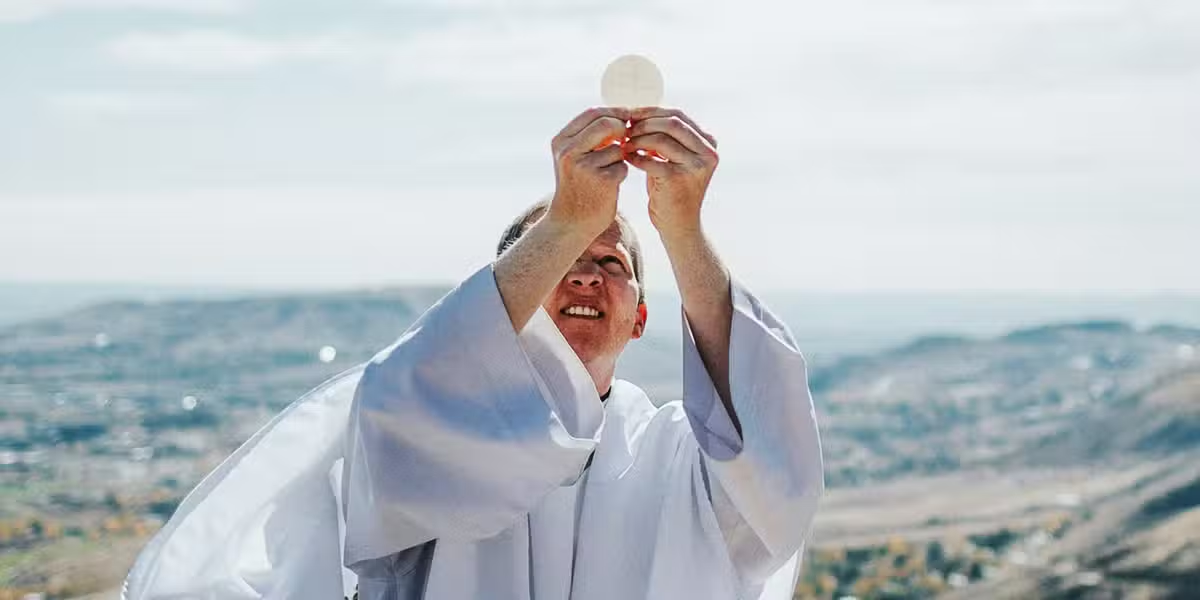Sometimes we need to be brought to the edge of darkness to realize how much we’ve already been given by God to enjoy and celebrate. This can be the case even if we are religiously attuned, spiritually alert, and psychologically healthy.
Life presents the unexpected often in a compounded way—a loved one becomes ill or dies, no job can be found, an addiction rages in someone close to you, a relationship falls apart, or you find yourself overwhelmed because you are caring for both adult children and aging parents. It is during these challenging times that a circle of grace is formed, if a healthy perspective, gratitude, and happiness are cultivated. Otherwise, we are in danger of losing ourselves as the waves of circumstance come crashing down.
New peace and joy are seeded when a healthy perspective is established. When we can see situations with greater clarity, we are willing to face what is actually before us. Unrealistic expectations are jettisoned; projections of blame, harshness, or self-attack are released. This does not mean that the crisis has passed, but how we view our world and our place in it has shifted.
Poet John Milton said, “Gratitude bestows reverence, allowing us to encounter everyday epiphanies, those transcendent moments of awe that change forever how we experience life and the world.” It is in these transformational moments that “a spiritual and psychological pearl of great price” can found: a healthier perspective that engenders contentment. This may not necessarily be the fulfillment of what you want next, but the realization of what you already have.
Brother David Steindl-Rast, who went through the blitzkrieg of World War II, noted in his book Gratefulness that many leave their homes with a preconceived gratefulness list. He suggests tossing it out and considering all we encounter with the “eyes of surprise” (i.e., a healthy perspective). He says, “Even the predictable turns into surprise the moment we stop taking it for granted. . . . Surprise is no more than a beginning of that fullness we call gratefulness. Do we find it difficult to imagine that gratefulness could ever become our basic attitude toward life? In moments of surprise we catch at least a glimpse of the joy to which gratefulness opens the door. More than that—in moments of surprise we already have a foot in the door.”
Monk and mystic Thomas Merton deepens what Brother David states by noting further: “To be grateful is to recognize the Love of God in everything He has given us—and He has given us everything. Every breath we draw is a gift of His love, every moment of existence is a grace, for it brings with it immense graces from Him. Gratitude therefore takes nothing for granted, is never unresponsive, is constantly awakening to new wonder and to praise of the goodness of God. For the grateful person knows that God is good, not by hearsay but by experience. And that is what makes all the difference.”
Six Steps
With these concepts in mind, here are six simple—and we have found to be surprisingly powerful—suggested steps to refine your practice of gratitude:
1. Start where you are. As a child of God, you are special simply because he has made you in his image and loves you unconditionally. Fully embrace your worth and be content with who and where you already are. Not to do so would be to miss the grace.
2. Become like a child and allow wonderment to flow. Somewhere along the road to becoming an adult, many of us have forgotten to count the fireflies on a summer’s night, chase butterflies through the fields, and marvel at the perfection of a robin’s egg. Don’t be shy—jump in!
3. Realize that time is of the essence. We can fail to acknowledge the impermanence of life or fall into the trap of an anxiety-driven life. Impermanence helps us realize how pressure-filled and fleeting our time on earth is—no matter how idyllic the setting.
4. Recognize that everything is already ours. We do not need something or someone to be happy. This illusion can keep us stuck for a lifetime. Instead, realize with a truly grateful heart: we have everything we need whether we technically own it or not.
5. Stay in the now. Being aware of the true fragility of life—namely, that we are dying and everyone else is dying too—helps us be grateful. It helps us to appreciate the people around us and the affluence that we already possess.
6. Release illusions. Deep gratitude nourishes contentment by opening our eyes to the hidden, undeserved graces that show up each day. Most people are, unfortunately, oblivious to these graces because they have predetermined what will make them happy and are, therefore, closed to everything else that is set before them.
Gratitude and Happiness
Flourishing in life takes effort. Walker Percy, in his book The Moviegoer, suggested that, “The search is what anyone would understand if he were not sunk in the everydayness of his own life. . . . To become aware of the possibility of the search is to be onto something. Not to be onto something is to be in despair.” Life can be drudgery or an adventure defined by a healthy perspective, gratitude, and happiness. When we choose the latter, it reflects our willingness to accept God’s gift of joy that is freely and abundantly given to all of us who seek divine wonder.
Not to do this is actually, in a word, dangerous. To return to physician and writer Walker Percy’s words, we can see why this is so. In one of his novels, he writes, “What if life is like a plane and we miss it?” Clearly, in today’s anxious, busy, and stressful world, this is so easy to do. And, given all that God has given us, this would be a terrible shame not only for us, but also for those in our lives who would benefit from our sharing the positive joy we experience within ourselves through gratitude and happiness.








